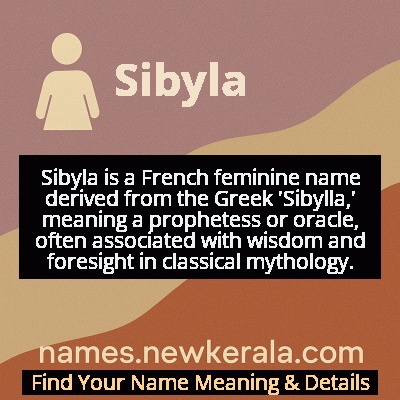Sibyla Name Meaning & Details
Origin, Popularity, Numerology Analysis & Name Meaning of Sibyla
Discover the origin, meaning, and cultural significance of the name SIBYLA. Delve into its historical roots and explore the lasting impact it has had on communities and traditions.
Name
Sibyla
Gender
Female
Origin
French
Lucky Number
5
Meaning of the Name - Sibyla
Sibyla is a French feminine name derived from the Greek 'Sibylla,' meaning a prophetess or oracle, often associated with wisdom and foresight in classical mythology.
Sibyla - Complete Numerology Analysis
Your Numerology Number
Based on Pythagorean Numerology System
Ruling Planet
Mercury
Positive Nature
Adventurous, dynamic, curious, and social.
Negative Traits
Restless, impatient, inconsistent, prone to indulgence.
Lucky Colours
Green, white.
Lucky Days
Wednesday.
Lucky Stones
Emerald.
Harmony Numbers
1, 3, 9.
Best Suited Professions
Sales, marketing, travel, entertainment.
What People Like About You
Versatility, charisma, adventurous spirit.
Famous People Named Sibyla
Sibylla of Jerusalem
Queen of Jerusalem
Ruled during the critical period of the Third Crusade and maintained the kingdom's stability
Sibylla of Anjou
Countess of Flanders
Founded the Abbey of Saint-Aubert in Cambrai and served as effective regent
Sibylla of Burgundy
Duchess of Burgundy
Mother of Pope Callixtus II and influential in Burgundian political affairs
Sibylla of Acerra
Queen of Sicily
Served as regent for her son and navigated complex political landscapes
Name Variations & International Equivalents
Click on blue names to explore their detailed meanings. Gray names with will be available soon.
Cultural & Historical Significance
French nobility frequently adopted the name, blending classical heritage with Christian traditions, as sibyls were sometimes interpreted as pagan precursors to biblical prophets. This dual heritage made Sibyla a name that conveyed both aristocratic prestige and spiritual depth, reflecting the complex interplay between classical learning and Christian faith that characterized medieval European culture. The name's association with royal women like Sibylla of Jerusalem and Sibylla of Anjou further cemented its status as a name of power, wisdom, and noble bearing in French cultural memory.
Extended Personality Analysis
Individuals named Sibyla are typically characterized by exceptional intuition, wisdom, and a contemplative nature. They often possess a deep inner world and strong analytical abilities, enabling them to perceive patterns and truths that others might miss. This natural insight frequently manifests as good judgment in practical matters and an ability to offer sound advice to others. Their thoughtful disposition makes them excellent listeners and problem-solvers, though they may sometimes appear reserved or distant as they process information internally.
Sibylas tend to be highly principled individuals with strong moral compasses, often demonstrating loyalty and dedication in their relationships. They typically value knowledge and learning, showing particular aptitude for subjects that require deep understanding rather than superficial knowledge. While they can be perfectionistic and occasionally skeptical, their fundamental desire is to understand the world in its complexity and to help guide others with the wisdom they accumulate through observation and reflection. Their combination of intellectual depth and emotional intelligence makes them particularly effective in roles that require both analysis and human understanding.
Modern Usage & Popularity
In contemporary times, Sibyla remains a rare but distinguished choice, particularly in French-speaking regions where it maintains its aristocratic and intellectual connotations. While never achieving widespread popularity, the name has experienced modest revivals during periods of interest in historical and mythological names. In France, it ranks outside the top 500 names but continues to be chosen by parents seeking a name with depth, history, and unique character. The name appeals particularly to educated, culturally-aware families who appreciate its classical roots and literary associations. Modern usage often shortens to 'Sibyl' or 'Sybille' for everyday convenience, though the full 'Sibyla' form retains its formal elegance. The name's rarity in the 21st century makes it an excellent choice for parents seeking a distinctive yet historically grounded name that stands out without being overly unconventional, while its strong feminine identity and intellectual associations align well with contemporary values of female empowerment and education.
Symbolic & Spiritual Meanings
Symbolically, Sibyla represents the archetype of the seer, the wise woman, and the keeper of hidden knowledge. The name embodies the concept of foresight and intuition, symbolizing the ability to perceive deeper truths beyond surface appearances. It carries connotations of wisdom that comes from both experience and innate understanding, representing the bridge between known and unknown, present and future. In metaphorical terms, Sibyla signifies the voice of conscience, the inner guide that helps navigate life's complexities. The name also symbolizes the preservation and transmission of knowledge across generations, echoing the historical role of sibyls as guardians of prophetic traditions. Additionally, it represents feminine wisdom and power in its most respected form—not as domination but as guidance, insight, and the quiet authority that comes from genuine understanding rather than imposed control, making it a powerful symbolic name for modern women who value both intelligence and intuition.

